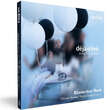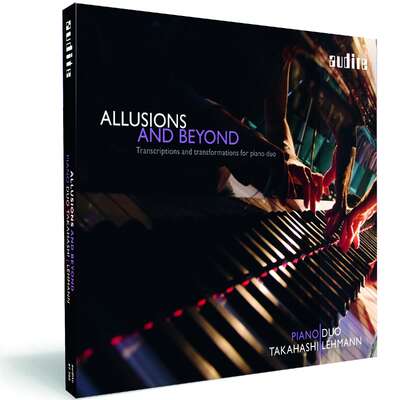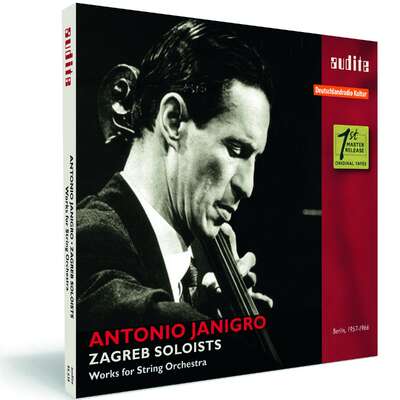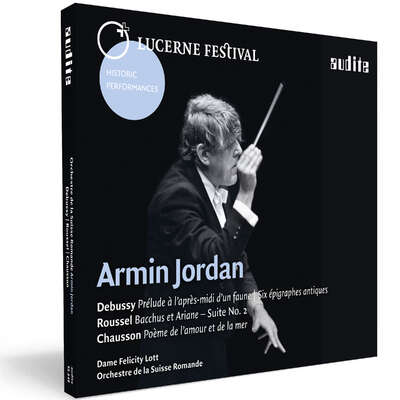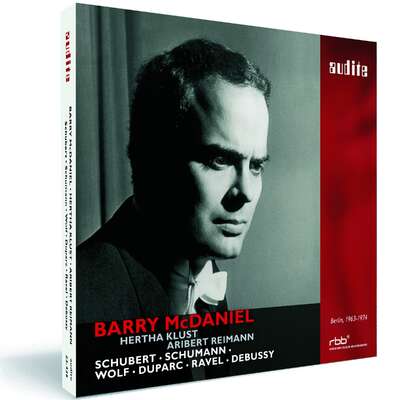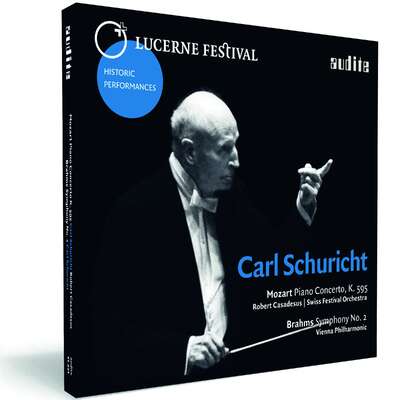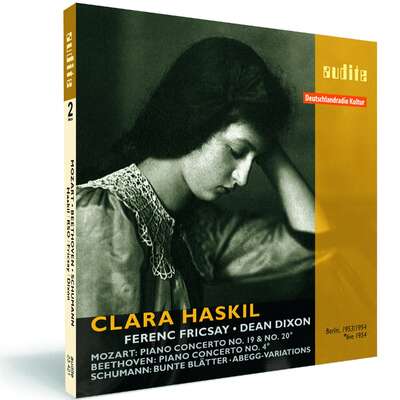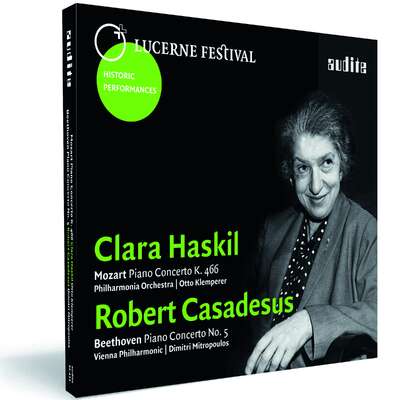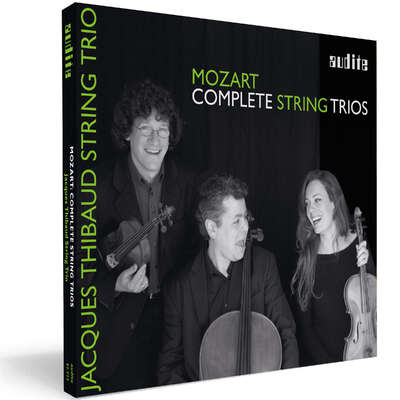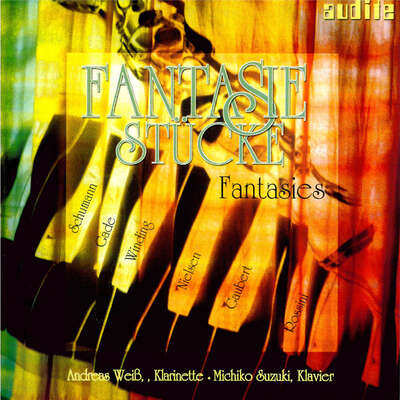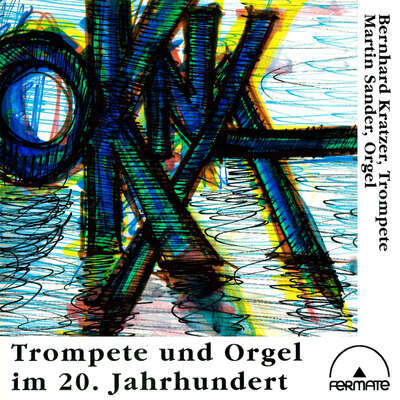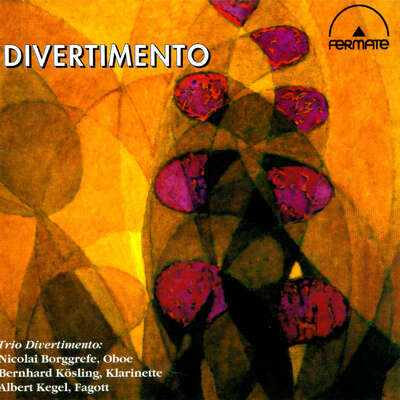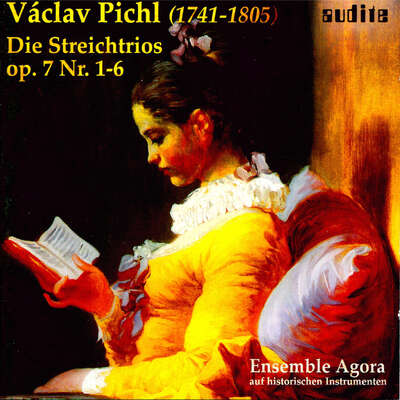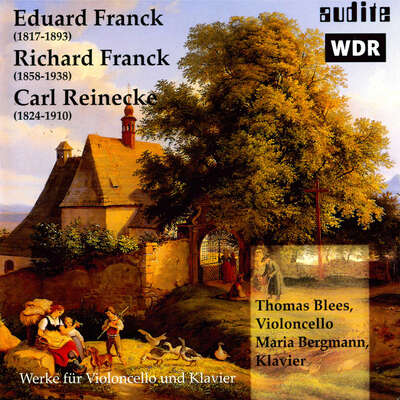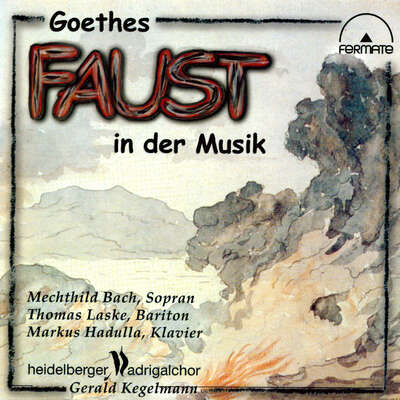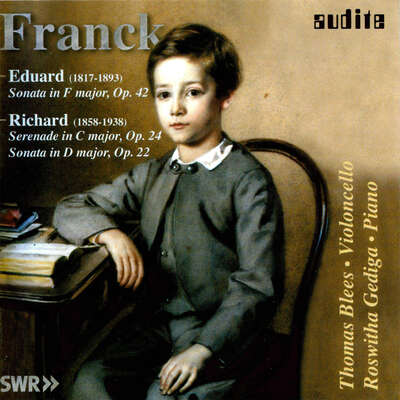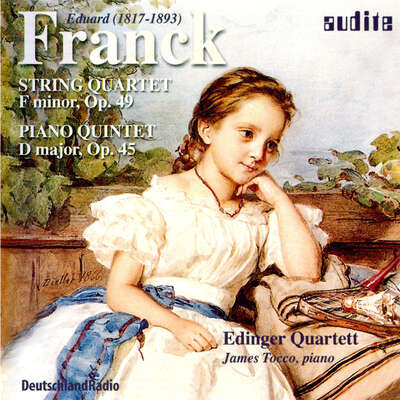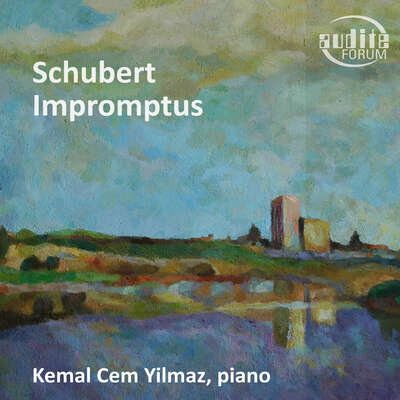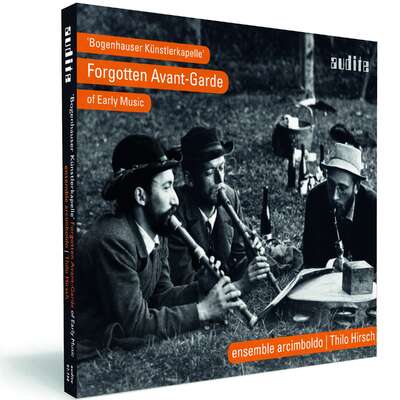
Bernd Alois Zimmermanns „Monologe“ stoßen einen Dialog zwischen Komponisten und Werken voller kreativer Schöpfungskraft und musikalischer Spielfreude an. Davon inspiriert entwickelte das Klavierduo Neeb sein Debüt-Programm, das – um die klanglichen Möglichkeiten des Schlagzeugs erweitert – die Welt des „Spontanen, Assoziativen, Traum- ja Trancehaften“ (B. A. Z.) beschwört.mehr
"Das Spiel vom Klavierduo Neeb ist exzellent. Bei Debussy und Schachtner kommen dann noch die Perkussionisten Christian Benning und Patrick Stapelton hinzu. Zusammen ergibt das eine phantasievolle und spannende Klangmischung nicht minder spannender und äußerst origineller Transkriptionen." (Pizzicato)
Titelliste
Diesen Bonustrack erhalten Sie ausschließlich als Download!
Details
|
déjà-rêvé
Dialogues across time |
|
| Artikelnummer: | 97.813 |
|---|---|
| EAN-Code: | 4022143978134 |
| Preisgruppe: | BCA |
| Veröffentlichungsdatum: | 5. Januar 2024 |
| Spielzeit: | 78 min. |
Zusatzmaterial
Informationen
Besprechungen
Fanfare | September / October 2024 | Henry Fogel | 1. September 2024
This is a recording more interesting in concept than in execution. The German piano duo of brother and sister Sophie and Vincent Neeb have beenMehr lesen
Johannes X. Schachtner (b. 1985) is a German composer and arranger whose appealing Bach. Choral.Exerzitien presents transformations of seven Bach chorales for two pianos and percussion; it is the longest piece here. These are colorful, sensitive renderings that treat the originals with great respect. The music is mostly quiet, embracing a wide range of colors, from the delicate to the dramatic. This is the only recording I am aware of, so I have no alternative available for comparison.
Schachtner contributes the arrangement of Debussy's Jeux for two pianos and percussion, which also exploits a wide range of percussion instruments. I think the arrangement is tasteful and imaginative, but the performance, particularly by Klavierduo Neeb, misses the playfulness of the score. There is too little flexibility and a lack of color from the pianos.
Bernd Alois Zimmermann's Monologues for Two Pianos serves as the inspiration for the entire program, as Zimmermann quotes Debussy's Jeux, Bach chorales, and bits of the Mozart concerto in his piece. Zimmermann's pointillistic writing also would benefit from a softer and more varied touch. Listening to Alfons and Aloys Kontarsky on DG reveals the coloristic opportunities available in the music.
Good recorded sound and informative program notes complete the package. I would have liked to be able to summon greater enthusiasm for this disc, but the monochromatic and overly aggressive playing made that difficult.
ORF Ö1 | "Vorgestellt", 7. März 2024, 11:30 Uhr | Marie-Theres Himmler | 7. März 2024 | Quelle: https://oe1.orf.... BROADCAST: "Vorgestellt" - Die Neebs am Klavier
Zwei Geschwister, zwei Klaviere, zwei Alben: "déjà-rêvé - Dialoge über die Zeiten hinweg" und "Sparks of Spirit".<br /> <br /> Sophie (geb. 2000) undMehr lesen
Sophie (geb. 2000) und Vincent Neeb (geb. 1998) sind Geschwister. Schon in frühen Jugendjahren haben sie das gemeinsame Musizieren am Klavier für sich entdeckt. Eine Entdeckung, die auch der Außenwelt nicht verborgen blieb: zahlreiche Wettbewerbspreise und Stipendien wurde dem Klavierduo seither zuteil. Beim Label audite veröffentlicht das Duo nun gleich zwei Alben innerhalb kurzer Zeit.
Das Debütalbum "déjà-rêvé" trägt den Untertitel "Dialoge über die Zeiten hinweg" - damit hatte der deutsche Komponist Bernd Alois Zimmermann einst sein Werk "Monologe für zwei Klaviere" beschrieben, in dem er historische Kompositionen einfließen lässt und zitiert. Das Stück bildet den Ausgangspunkt des Albums, auf dem das Klavierduo Neeb diesen Dialog-Gedanken gemeinsam mit zwei Gast-Perkussionisten auf kreative Art weiterspinnt.
Wenig später hat das Klavierduo Neeb weitere Funken ihres gemeinsamen Schaffens auf Tonträger gebannt: "Sparks of Spirit". Sophie und Vincent Neeb widmen sich darauf Werken, die im Leben der Komponisten Schubert, Bach, Reger und Rachmaninoff jeweils den Beginn eines neuen Lebensabschnitts markierten - ähnlich wie diese beiden exzellenten Tonträger wohl eine neue Ära bei den Neebs einläuten.
Sophie (geb. 2000) und
Gramophone | March 2024 | David Fanning | 1. März 2024 | Quelle: https://www.gram...
Ever since Bartók’s 1937 Sonata, the medium of two pianos and percussion has exerted a compelling fascination on contemporary composers, not leastMehr lesen
The Monologues are described by the composer as ‘dialogues across time between dreamers, lovers, those who suffer, and those who pray’. Sadly, the music itself scarcely lives up to that characterisation. Its chief value, rather, is as a document of incipient postmodernism, when combining serial fragmentation with quotation (from Gregorian chant to Messiaen) felt like a release rather than a mere shifting of cells within a masochistic self-incarceration block. Performances of fearless concentration and a recording of pristine quality do something to redeem the piece. But to hear what can be done in this medium and with something like this aesthetic, when aural acuity and poetic sensibility really get to work, try George Crumb’s Makrokosmos III (1974).
Or indeed try Johannes Schachtner’s creative transformations of six Bach chorales. These are true adventures in harmonic and timbral recolouring, ranging from respectful reimagining to quizzical time-travelling to drastic confrontation. Played with energy and commitment, as here, they are captivating in the instant and varied enough to reward repeated hearing.
Schachtner’s arrangement of Debussy’s Jeux is deft and dashing, qualities matched by the performance, producing a melange of colours that is almost as entrancing as the orchestral original. Unsurprisingly, metallophones and other tuned percussion are much to the fore, which serves to bring the element of orientalism to the surface.
The first movement of Mozart’s K467 Concerto is included because it is among those pieces referenced in Zimmermann’s Monologues. However, as resourceful as the arrangement is, not least in the cadenza, it cannot easily escape associations with conservatoire studios and auditions. In fact it is precisely the element of dialogue that suffers, through the confusion of orchestral and solo lines, if anything emphasised by playing that treads a fine line between crisp and clattery.
The disc also contains an uncredited piece that goes by the title Superinvention: a witty reworking from Carnival of the Animals, but not described in the booklet note or mentioned in the track-listing. Overall, then, this is an auspicious debut recording from the young brother-and-sister team of Klavierduo Neeb, but the programme itself offers mixed rewards.
Piano News | 2/2024 (März/April) | Carsten Dürer | 1. März 2024
die Neebs [spielen] brillant. [...] Spiellust, das Drama und die Leichtigkeit weiß das Klavierduo bestens umzusetzen. [...] Eine CD, die aufhorchen lässt und an die Brüder Kontarsky erinnert.Mehr lesen
Radio Bremen | 11.02.2024 "Klassikwelt", 19:00 Uhr | Wilfried Schäper | 11. Februar 2024 | Quelle: https://www.brem... BROADCAST
Einen schönen guten Abend und herzlich willkommen. Ein blutjunges und brillantes Klavierduo, Musik des 17-jährigen Hans Werner Henze, einMehr lesen
Im Mai des letzten Jahres war ich zu einem Konzert im Bremer Sendesaal. Da hat damals ein junges Klavierduo gespielt, die Geschwister Sophie und Vincent Neeb. Ich kannte die beiden nur vom Namen nach, aber ihr Auftritt im Sendesaal hat mich umgehauen. So ein brillantes, intelligentes und hochmusikalisches Spiel an 2 Klavieren habe ich selten gehört. Sophie und Vincent Neeb haben im Bremer Sendesaal gleich 2 CDs mit einem sehr ungewöhnlichen Repertoire aufgenommen. Wir starten mit dem ersten Satz aus Mozarts berühmtem Klavierkonzert C-Dur, Köchelnummer 467. Sophie und Vincent Neeb haben es für 2 Klaviere bearbeitet, und das funktioniert erstaunlich gut…
Musik: Mozart – 14´23 (audite 97.813, Track 2)
Ein bekanntes Stück in neuer Verpackung – der erste Satz aus Mozarts Klavierkonzert Nr. 21 in C-Dur, arrangiert für 2 Klaviere von Sophie und Vincent Neeb. Die beiden spielen diese gelungene Bearbeitung auf ihrer brandneuen Platte „Déja-revé“ mit Stücken von Mozart bis zur Moderne. Das junge und wirklich extrem begabte Duo hat gerade gleich 2 Debüt-CDs veröffentlicht. Beide sind übrigens im akustisch traumhaften Sendesaal Bremen entstanden. Später noch mehr vom Klavierduo Vincent und Sophie Neeb hier in Klassikwelt auf Bremen Zwei.
Die Neeb-Geschwister sind jetzt Mitte 20. […]
Einen schönen guten Abend und willkommen. In diese Stunde starten wir mit einem jungen und tollen Klavierduo. Die Geschwister Sophie und Vincent Neeb haben gerade gleich 2 Debüt-CDs veröffentlicht. Das Repertoire der Alben ist breit gestreut, reicht von Bach über Mozart bis hin zu Rachmaninoff und Bernd Alois Zimmermann. Im Mai des vergangenen Jahres habe ich das Klavierduo Neeb live im Bremer Sendesaal gehört. Das war ein Superkonzert mit 2 jungen Spitzenpianisten. Die beiden spielen atemberaubend gut zusammen. Bachs Konzert für 2 Klaviere nach dem berühmten Doppelkonzert für 2 Violinen spielen Sophie und Vincent Neeb mit einem fast „jazzigen“ Drive und ganz viel Temperament…
Musik: Bach – 13´25 (audite 97.814, Tracks 10 – 12)
Tolles Spiel an 2 Klavieren von Sophie und Vincent Neeb. Das war Johann Sebastian Bachs Konzert c-moll nach dem berühmten Doppelkonzert für 2 Violinen. Vincent Neeb hat es für 2 Klaviere ohne Orchester bearbeitet. Zu hören ist diese mitreißende Version auf dem Debüt-Album des Neeb-Klavierduos mit dem schönen Titel „Sparks of Spirit“. Sophie und Vincent Neeb, 2 großartige und hochbegabte Musiker, von denen man bestimmt noch viel hören wird!
RBB Kulturradio | Samstag 13.01.2024, 18-19 Uhr "Talente und Karrieren" | Dirk Hühner | 13. Januar 2024 | Quelle: https://www.rbb-...
BROADCAST "TALENTE UND KARRIEREN"
Träume und Dialoge: Das Klavierduo Neeb
Die Geschwister Sophie und Vincent Neeb haben sich für ihr Debüt-Album ein verschachteltes Programm vorgenommen: Sie spielen ein Stück von BerndMehr lesen
www.pizzicato.lu | 04/01/2024 | Alain Steffen | 4. Januar 2024 | Quelle: https://www.pizz... Raffinierte Transkriptionen
Ausgehend von Bernd Alois Zimmermanns Komposition Monologe für zwei Klaviere, einer meisterhaften Transkription seines Konzertes Dialoge für zweiMehr lesen
Alle hier versammelten Transkriptionen sind raffiniert ausgearbeitet und behaupten sich als eigenständige Kompositionen. Das Spiel vom Klavierduo Neeb ist exzellent. Bei Debussy und Schachtner kommen dann noch die Perkussionisten Christian Benning und Patrick Stapelton hinzu. Zusammen ergibt das eine phantasievolle und spannende Klangmischung nicht minder spannender und äußerst origineller Transkriptionen.
English Translation:
Based on Bernd Alois Zimmermann's composition Monologe for two pianos, a masterful transcription of his concerto Dialogues for two pianos and orchestra, the piano duo Neeb expands the playing field with arrangements of Debussy’s Jeux (Arr. Johannes X. Schachtner), the Allergro from Mozart’s Piano Concerto No. 21 (Arr. Klavierduo Neeb) and Johannes Schachtner’s work Bach.Choräle.Exerzitien, which imaginatively combines transcription and recomposition.
All the transcriptions collected here are cleverly worked out and assert themselves as independent compositions. The playing of the piano duo Neeb is excellent. Debussy and Schachtner are joined by the percussionists Christian Benning and Patrick Stapelton. Together, this results in an imaginative and exciting sound mixture of no less exciting and extremely original transcriptions.
www.musicweb-international.com | DECEMBER 18, 2023 | Jeffrey Hollander | 18. Dezember 2023 | Quelle: https://musicweb...
The debut recording of the Klavierduo Neeb offers a varied and intriguing program of works for two pianos, with and without added percussion. There isMehr lesen
Bernd Alois Zimmermann’s Monologe (Monologues) for two pianos, from 1964, serves as the focal point for such connections. Zimmermann, a key figure in the German avant-garde of the 1950s and 1960s, was attentive to his musical past, and the mixing and layering of diverse musical materials was a frequent element of his musical style. Monologues, in five sections of different lengths running to approximately 18 minutes in total, is characterized by atmospheric effects, frenetic bursts of energy, extreme registral shifts, all of which requires virtuosic musical coordination between the two pianists. Out of this modernist complexity emerge recognizable musical ‘memories’ or quotations. Bach’s ‘Wachet auf, ruft uns die Stimme’ and ‘Vater unser im Himmelreich’ combine with melodies from Messiaen’s L’Ascension. Atmospheric snippets of Debussy’s ‘Feux d’artifice’, from his second book of Préludes, and his ballet Jeux slide in and out of view. Bits of Mozart and Beethoven figuration appear, reminiscent perhaps of years of keyboard training. The effect is not of pastiche. Zimmermann is suggesting that our past musical experiences remain with us even as we generate new ones, an idea that is very much of the present; composers of our time comfortably draw on music of all styles and all of music history as source material.
The performance of Monologues is generally brisk and straightforward, well-played by Klavierduo Neeb. The players effectively convey the feeling of memories emerging from a distance (‘wie aus der Ferne’ as the Dutchman sings in Der fliegende Holländer). The gold-standard performance remains the 1979 recording by Alfons and Aloys Kontarsky, the dedicatees to whom Zimmermann’s musical language comes utterly naturally, still available as a download (DG). I’m also particularly fond of Huber and Thomet (2013, Wergo), whose more relaxed traversal is loving and cogent. Several other performances have much to offer as well. In this impressive company of duo-pianists, the Klavierduo Neeb more than hold their own.
To explore the idea of musical dialogues moving back and forth across time, Klavierduo Neeb has chosen some of the works quoted in the Zimmermann, and has subjected them to further arrangement. In two of these works, the Neebs are joined by two excellent percussionists, Christian Benning and Patrick Stapleton.
I’m quite impressed with Johannes X. Schachtner’s homage to Bach (and to György Kurtág’s four-hand transcriptions of Bach) entitled Bach.Choral.Exerzitien, arrangements of seven of Bach’s chorale preludes for two pianos and percussion, including both ‘Wachet auf’ and ‘Vater unser im Himmelreich’. The composer exhibits a striking variety of arrangement techniques, and a lovely ear for sonority and timbral effect, and the performance is first-rate. The worklist on Schachtner’s website suggests that he, like Zimmermann, is attentive to music of the past, as well as prolific.
Another arrangement by Schachtner for two pianos and percussion opens the disc: Debussy’s ballet Jeux, which the composer called a ‘poème dansé’. Again, the arrangement for these forces is attractive, with lovely sonorities. Compared to Jean-Efflam Bavouzet’s arrangement of Jeux for two pianos alone, which is tremendously effective, the added percussion does little to propel the flighty, improvisatory narrative. Indeed, the synchronization of four players here results in an overly cautious and rhythmically rigid performance, a Jeux with less momentum and shape than (in Bavouzet’s arrangement) as recorded by Bavouzet and François-Frédéric Guy on a lovely disc of two-piano arrangements (Chandos CHAN), or Vladimir and Vovka Ashkenazy in two-piano works by Debussy and Ravel (Decca).
The final work on the disc is the first movement of Mozart’s C-major piano concerto, K. 467, arranged brilliantly for two pianos by the Neebs. Snippets of this movement appear in Zimmermann’s Monologues, though that connection is tenuous. All of the orchestral and solo material is present; the solo passages have been filled out with playful counterpoint and filigree, giving this the feeling of a double concerto, and the movement culminates in a lively cadenza. This is joyous playing, perhaps lacking only the last degree of flexibility.
The digital download adds a bonus track not on the physical CD: another Bach-inspired composition by Schachtner, entitled SuperInvention. Invention No. 6 for Two Pianos and Percussion, which also communes with Saint-Saëns and Strauss along the way. Quite delightful.
The recorded sound by audite is excellent, and the presentation is very attractive. The program is nicely varied, with the piano-plus-percussion arrangements sitting comfortably alongside the Zimmermann; if the Mozart is more of an outlier, that surely doesn’t matter much. I look forward to the next offering from this talented piano duo.
